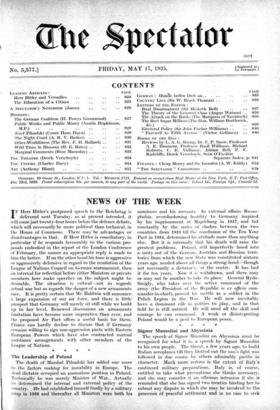* * The Leadership of Poland The death of Marshal
Pilsudski has added one more to the factors making for instability in Europe. The dead dictatOr occupied an anomalous position in Poland. Technically he was merely Minister of War... Actually. he determined the internal and external policy of the country. He had established himself finally by a military. coup in 1926 and thereafter all Ministers were both his nominees and his servants. In external affairs Russo- phobia, overshadowing hostility to Germany inspired by his imprisonment at Magdeburg in 1917; and fed constantly by the series of clashes between the two countries from 1919 till the conclusion of the Ten Year Pact-in 1934, determined his attitude more than anything else. But it is internally that his death will raise the greatest problems. Poland, still imperfectly fused into a unity out of the German, Austrian and Russian terri- tories from which the new State was constituted sixteen years ago, needed above all things a strong hand--though not necessarily a dictator's---at the centre. It has had it for ten years. Now it is withdrawn, and there may or may not be another to take its .place. General Rydz- Smigly, who takes over the active command of the army -(the President of the Republic is ex officio com- mander-in-chief), proved his mettle as a soldier in the Polish Legion in the War. He will now inevitably have a dominant role in politics to play, and in that field he is still untried. He Will need all the skill and courage he can command. A weak or disintegrating Poland would be a peril to European .peace.










































